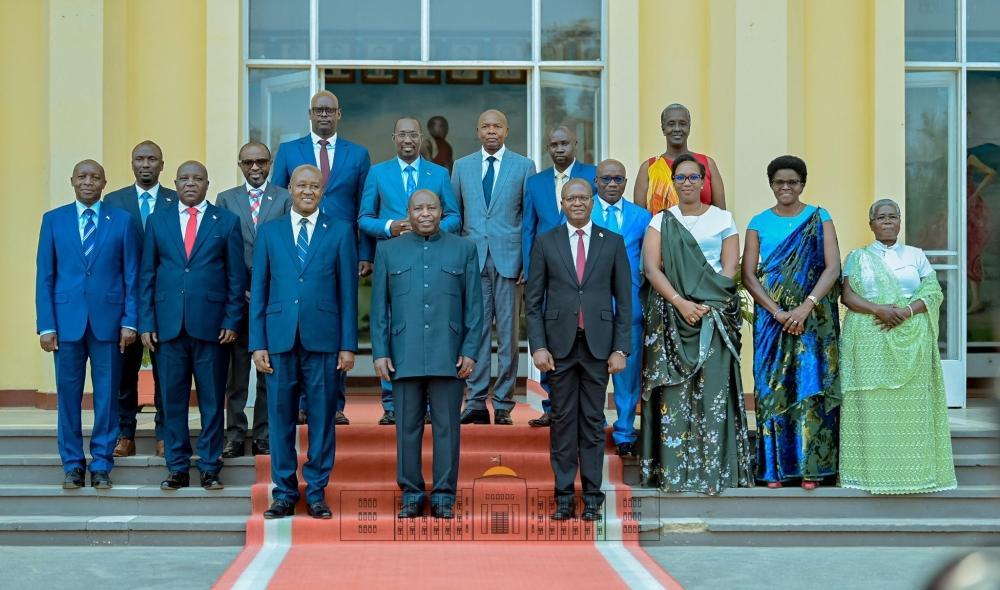Tom Ndahiro
Africa-Press – Rwanda. When President Evariste Ndayishimiye of Burundi announced in August 2025 that Dr. Édouard Bizimana would be his government’s new Minister of Foreign Affairs, Regional Integration, and Development Cooperation, the diplomatic world hardly bat an eyelid. Usually, things like cabinet reshuffle or other appointments in Gitega or Bujumbura hardly make international news because the country is too often seen as a petty player in East African geopolitics.
But those who know the history of the African Great Lakes Region, especially the ideological currents that have fueled its darkest chapters of genocidal pogroms, recognized the move for what it is. This was not merely a cabinet reshuffle, but the newest mutation of Hutu Power’s long and venomous afterlife. It was not merely an appointment. It was a blunt declaration. A statement in a manifesto. A politico-diplomatic tattoo inked boldly on the forehead of the Burundian Head of state: We are very much open for business with Hutu-Power ideology.
Unmistakably, President Ndayishimiye pulled a political feat so barefaced that it made Rwandan genocidaires like Hassan Ngeze and Léon Mugesera nod in admiration wherever they were.
With 21 years in Burundi’s Diplomatic circles, Dr. Bizimana is not some unknown technocrat. He comes to head his country’s diplomacy—pre-packaged with his own Kangura-style publishing arm, conveniently delivered through the X platform (formerly Twitter), where he has spent time perfecting the art of injecting genocidal nostalgia into 280 characters. If you read his feed long enough, you might mistake it for an FDLR press office.
The appointment speaks volumes
When Ndayishimiye signed Bizimana’s appointment letter, he wasn’t just filling a vacancy. He was sending a political love letter to the FDLR, the genocidal militia-turned-political-organization still clinging to the fantasy of a Rwanda without Tutsi.
Under normal circumstances, this appointment of a new foreign minister might have prompted guesswork about diplomatic policy shifts like investments, trade or international alliances. In Burundi, it prompts speculation about which Kangura articles are being dusted off for translation into Portuguese, Arabic, Swahili, French and English to circulate at the next African Union summit.
For a genocide survivor or scholar, the symbolism is shocking. It’s as if, in the middle of the post-Holocaust process of denazification, a European head of state had appointed Julius Streicher, the editor of Der Stürmer, as their chief diplomat — and then smiled for the cameras.
Bizimana’s political résumé is written, in letters dripping with venom, across years of social media posts that read like serialized propaganda bulletins for the Hutu-Power cause.
The temptation might be to dismiss Bizimana’s comments as part of the rough-and-tumble of African diplomatic spats — the same way leaders in the DRC blame Rwanda for everything from rebel movements to bad weather. But that would be dangerously naïve.
When such language comes from an ordinary social media user, it’s ugly. When it comes straight from a presidential advisor and now head of diplomacy— it is not a gaffe, it befits official rhetoric. It is a policy dressed as personal insult.
It shapes state-to-state relations, influences public opinion, and signals to ideological allies that old hatreds are once again respectable currency in political exchange.
This is why the appointment of Bizimana matters. It is not about Burundi’s role in the East African Community, African Union or its vote at the UN General Assembly. It is about the normalization of genocidal discourse within the highest ranks of a sovereign government.
Old ideology and new face
If Burundi wanted a foreign minister whose social media feed reads like a rolling Kangura magazine—full of slurs, conspiracy theories, and ethnic diatribe—it got one. On February 1, 2025, six months before his appointment, Bizimana posted on the X platform (formerly Twitter)— openly aiming at Rwanda’s Foreign Minister, Olivier Nduhungirehe:
“Finally, one must understand the attitude of Olivier Nduhungirehe, a Hutu de service and former Interahamwe who seeks to be accepted by the Rwandan Tutsi establishment by holding views that even his leaders would not dare express. The @fdnbbi have nothing to do with the FDLR.”
When Ndayishimiye’s man calls Rwanda’s foreign minister a “Hutu de service” and a “former Interahamwe,” he is not innovating but just recycling. The name-calling are not spontaneous political jabs. Both sticky tags are not only unfounded; they are drawn directly from the linguistic toolbox of genocidal ideology. Let’s dissect this masterwork of falsehood.
First, the defamation: calling Nduhungirehe a “former Interahamwe” — a militia responsible for mass slaughter during the 1994 Genocide Against the Tutsi — knowing it is false. No doubt, this isn’t just a casual insult; it’s a measured act of reputational assassination, associating the other with—say a convicted mass murderer.
The term “former Interahamwe” is more than a smear; it’s a deliberate weaponization of Rwanda’s traumatic history. The Interahamwe were not a debating society; they were the machete-wielding militias who butchered over a million Tutsi and Hutus who opposed the crime in 1994.
The second insult — “Hutu de service” — is even more telling. This is not a nonaligned catchphrase. It is a term born of Hutu Power propaganda in the post-genocide era in mid-1990s—used to condemn Hutu who refused to embrace ethnic bigotry and who resolutely stood for coexistence or worked within institutions not controlled by the genocidal regime. Such Hutu were derided as “traitors” serving Tutsi masters, much as colonial collaborators were mocked in other contexts. In Rwanda, to be branded a “Hutu de service” was to be marked for social death, and often for physical elimination.
That Bizimana reached for this insult in 2025 tells us something chilling: Hutu Power thinking is not only alive in Burundi’s political bloodstream — it is thriving, and it is once again being deployed against Rwandans who are opposed to it, especially those in positions of influence.
This phrase ‘Hutu de service’ is pure Hutu-Power lexicon, lifted from the pages of Kangura or Simon Bikindi’s Song “Nanga Abahutu” and popularized in the political salons of the genocidaires in exile. It’s the idea that any Hutu who dares to work with, defend, or even coexist with Tutsi is a sellout, a puppet, a traitor to the race.
And just in case you missed the point, Bizimana reassures his audience that the Burundian armed forces have “nothing to do with the FDLR.” Coming from a man whose digital footprint could serve as a FDLR communications archive, the insincerity is platinum-grade.
Paul Rusesabagina, in his book—The Ordinary Man, explains “Hutu de service” as those token Hutus elevated to high-ranking positions but stripped of real authority — “Hutus for hire.”
In post-genocide politics, the term became a weapon to enforce loyalty to Hutu-Power ideology. Any Hutu who served in what the extremists deemed a “Tutsi-led government” risked being branded a sellout.
Rusesabagina’s description of “Hutu de service” captures the chilling mechanism of ethnic policing in post-genocide politics. A Hutu appointed to senior positions, only served to legitimize what they saw as a Tutsi-led government.
This was a pejorative label used to cut off and delegitimize any Hutu willing to cooperate with “Tutsi” political actors or participate in national reconciliation. This ideological gatekeeping led many ‘moderate Hutu’ to flee into exile, fearing for their lives or reputations.
This wasn’t just talk. For example, in 1995–96, ministers, ambassadors, and even the Governor of Rwanda’s Central Bank, Gérald Niyitegeka, fled into exile to avoid being labeled traitors by genocidal forces regrouping in the DRC. That is the reason why Rusesabagina himself left Rwanda for Belgium. It was the RDR — the political umbrella for exiled genocidaires — that enforced these loyalty tests with ferocity.
Some eventually returned to Rwanda when it became clear the extremists’ dream of military victory from the jungles of DRC was futile. But the underlying dogma — that Hutu and Tutsi cannot share political space — never died.
Bizimana’s rhetoric and the admiration he has from President Ndayishimiye proves it is alive and now occupies an office in Gitega with a view of the presidential palace.
Outrage over sympathy
Earlier that month, Bizimana was already rehearsing his lines. Responding to another statement by Nduhungirehe, he wrote:
“As a diplomat and a scholar, I find this post ridiculous and immature. How come @onduhungirehe, a Hutu from Rwanda, becomes a spokesperson of Congolese Tutsi?”
In this short but clear statement, the mask slips entirely. Bizimana’s disbelief is not about policy or principle; it’s about the sheer impossibility, in his worldview, of a Hutu defending Tutsi — even if those Tutsi are facing annihilation in a neighboring country.
This is not just bigotry; it’s a direct echo of Kangura’s infamous 8th Commandment: “A Hutu must never feel pity for a Tutsi.” There is no ambiguity or any political nuance. Compassion itself was criminalized.
In clear terms, President Ndayishimiye’s man is shocked that Minister Nduhungirehe has failed the ideological purity test of Hutu-Power. Published in December 1990, the Ten Commandments were a manifesto for ethnic hatred that directly paved the way to genocide. Bizimana’s surprise at a ‘Hutu’ defending Tutsi reflects that same inflexible ethnic absolutism.
Bizimana’s disbelief that a Hutu could defend Tutsi is not some bizarre individual prejudice; it is the purified essence of a political theology or philosophy stretching back to Rwanda’s first post-independence president, Grégoire Kayibanda. It is the transgenerational ideological DNA from PARMEHUTU to Kangura to Burundi’s State House and Foreign Ministry.
Kayibanda famously declared that Hutu and Tutsi were as different as “creatures from different planets,” a claim that became the philosophical backbone for decades of discrimination, pogroms, and eventually the 1994 genocide against Tutsi.
To appreciate Bizimana’s language, you have to comprehend the ideological framework behind it. In the years leading up to the Genocide Against the Tutsi, extremist politicians and media figures worked tirelessly to define who the “enemy” was. By the early 1990s, this worldview had been technologically and politically advanced into the Kangura magazine’s “Hutu Ten Commandments,” where the 8th made compassion toward Tutsi a serious racial treason.
In September 1992, the Rwandan army — under Maj. Gen. Deogratias Nsabimana — formalized the “Definition of the Enemy,” which ranked Tutsi inside and outside Rwanda as the number one enemies of the Hutu state. That memo was sent to every military unit, a bureaucratic step toward the slaughter that followed.
While I will not reproduce the full text of their infamous “Definition of the Enemy” memo — a poisonous catechism circulated among the Hutu-Power elite in 1992 — its core logic was simple: The Tutsi, whether in Rwanda or abroad, were the eternal enemy. And, therefore, a Hutu who collaborated with them was equally dangerous; and the “liberation” of Rwanda depended on their political and physical removal.
Bizimana’s X posts are simply the digital-age continuation of this lineage: the same message, new medium.
Make no mistake: Ndayishimiye did not accidentally stumble upon Bizimana’s X-Platform feed after signing his appointment announcement. He knew exactly who Dr. Edouard Bizimana was, what he believed, and the meaning of what he posted. It is the diplomatic equivalent of appointing a climate-change denier to head the Environmental Protection Agency — except the stakes here are not rising seas, but rising numbers of corpses.
Into the FDLR diplomacy
A month before his appointment— July 3, Bizimana posted on X: “FDLR is no more a threat to Rwanda but an alibi for your… to loot DRC. Your lies can no more hold.”
This post disregards a mountain of evidence—UN reports, human rights investigations, and uncountable testimonies all confirm the FDLR’s persistent use of terror, recruitment of child soldiers, and hate propaganda aimed at Tutsi populations inside and outside Rwanda. Yet Bizimana champions their cause, dismissing them as mere scapegoats used by Rwanda to justify interventions in the DRC.
This line of defense could be implanted, unrevised, into any FDLR press release of the last twenty years. The structure is the same: Always deny the FDLR is a dangerous entity; Systematically claim Rwanda uses it as an excuse to invade the DRC; and Ignore the documented massacres, recruitment of child soldiers, and anti-Tutsi propaganda that form the FDLR’s raison d’être.
President Ndayishimiye rightly recognized that his appointee isn’t just sympathetic to the FDLR narrative; he’s very fluent in it. The vetting process was thorough.
In choosing an avid supporter of FDLR and its ideology, Ndayishimiye made a deliberate decision to: make clear his ideological solidarity with the FDLR; reward the weaponization of Hutu-Power discourse; and certainly turn his country’s foreign policy into an extension of a genocidal propaganda campaign.
The Democratic Republic of Congo has been a battleground and sanctuary for genocidal forces for over 30 years. They regrouped, formed the FDLR, and have since been implicated in massacres, mass rapes, and the recruitment of child soldiers.
The FDLR’s ideology remains staunchly genocidal. Their existence embodies the refusal to accept Rwanda’s post-genocide order and a persistent attempt to destabilize the region. The Congolese state, weakened by decades of conflict and corruption, has often turned a blind eye or tacitly tolerated and even supported the FDLR’s presence due to ethnic and opportunistic political calculations.
This problematic fabric means the FDLR’s ideology has seeped into various parts of Congolese politics. Some factions have forged uncomfortable alliances, while others use FDLR rhetoric to fuel fatal ethnic fears or gain influence in local conflicts. It is now very clear, Burundi’s troops are not in the DRC to establish peace, but to defend their ideological ally, FDLR.
Burundi, under Ndayishimiye, seems to be leaning into this regional polarization. Bizimana’s open defense of the FDLR is a signal that the extremist narratives fueling the militia’s existence now have allies inside official government structures beyond the DRC’s borders.
By putting Bizimana at the helm of Burundi’s diplomacy, Ndayishimiye provides official approval to an ideology that legitimizes the FDLR, denies Rwanda’s genocide history, and sustains ethnic hatred.
It is a decision that symbolizes Burundi’s formal entry into a regional axis of denial and extremism, placing it firmly on the side of forces that reject peace, truth, and reconciliation.
In a region desperately needing bridge-builders and diplomats committed to stability, this is a regressive and perilous choice. Symbolically, it sends a clear message to survivors of the 1994 genocide against Tutsi: the ideology that killed your families is not only alive — it is sitting at the head of a foreign ministry table in Burundi. The message is unambiguous, the ideology which caused immense suffering in Rwanda and eventually in the region—has not only survived but has been granted diplomatic respectability.
Regionally, it deepens mistrust, poisons peace processes like Luanda and Nairobi, and reassures FDLR genocidaires who see a head of state openly rewarding their defenders. In the unstable context of the Great Lakes Region, words are never innocent. The region has seen how propaganda and hate speech lay the groundwork for mass violence and genocide.
Sadly, when people entrusted with diplomacy, like Bizimana, traffic in genocidal tropes and unjustified slurs—they elevate hate speech from the margins to the core of statecraft.
Internationally, the choice of Bizimana normalizes the idea that hate speech, historical revisionism, and denialism are acceptable tools of diplomacy. By appointing Bizimana, Ndayishimiye has done more than give the FDLR a friend in high office. He has made himself a co-flag bearer of their cause.
This appointment did not simply fill a vacancy. It flung open the doors of Bujumbura’s diplomacy to the ghosts of genocidal ideologies. Bizimana, long known for his unfiltered social media outbursts and unapologetic defense of the FDLR—the genocidal militia responsible for decades of instability and horror in the Democratic Republic of Congo (DRC)—was not a surprise choice. Rather, he was the fulfillment of an unspoken regional project: to give the FDLR’s hateful propaganda an official voice in government corridors.
In a region already plagued by the DRC’s endless war in its east, South Sudan’s fragile peace, and Somalia’s eternal insurgency, the last thing East Africa needs is another government official reviving the lexicon of genocide.
Yet that is precisely what Bizimana has done, and precisely what his appointment threatens to normalize. His words are not harmless, because in this part of the world, words have never been harmless. In 1994, radio presenters’ words became instructions for mass murder. Politicians’ words became lists for death squads.
The difference between then and now is only one of degree — and of how much the international community is paying attention to the vitriol on social media. Bizimana’s rhetoric—insulting a “Hutu” diplomat for defending Tutsi, openly siding with genocidal militias—repeats these precepts with peculiar loyalty. His appointment signals that the poisonous ideologies once restricted to extremist pamphlets and militia radio broadcasts have now leapt into the halls of official diplomacy.
In the relay race of hate, Kangura passed the baton to the FDLR, who passed it to President Ndayishimiye and his golden boy Bizimana, who now waves it from Burundi’s embassies around the world. The message is unmistakable: the war against truth and against Tutsi lives did not end in 1994 — it has simply been granted diplomatic immunity.
When history looks back on this moment— it will ask why a head of state decided to make the foreign minister’s chair a throne for a digital-age Hassan Ngeze.
And the answer will be the same one Kangura would have printed in bold type: Because in the politics of hate, devotion to ideology prevails over loyalty to truth.
Source: The New Times
For More News And Analysis About Rwanda Follow Africa-Press






